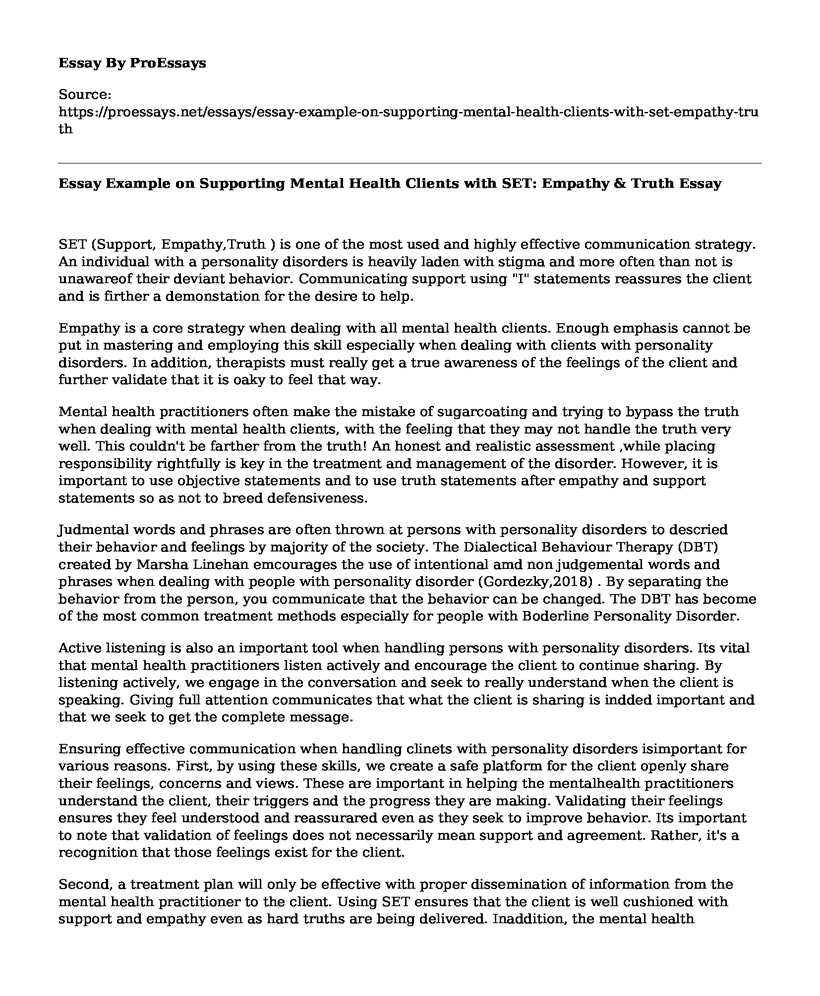SET (Support, Empathy,Truth ) is one of the most used and highly effective communication strategy. An individual with a personality disorders is heavily laden with stigma and more often than not is unawareof their deviant behavior. Communicating support using "I" statements reassures the client and is firther a demonstation for the desire to help.
Empathy is a core strategy when dealing with all mental health clients. Enough emphasis cannot be put in mastering and employing this skill especially when dealing with clients with personality disorders. In addition, therapists must really get a true awareness of the feelings of the client and further validate that it is oaky to feel that way.
Mental health practitioners often make the mistake of sugarcoating and trying to bypass the truth when dealing with mental health clients, with the feeling that they may not handle the truth very well. This couldn't be farther from the truth! An honest and realistic assessment ,while placing responsibility rightfully is key in the treatment and management of the disorder. However, it is important to use objective statements and to use truth statements after empathy and support statements so as not to breed defensiveness.
Judmental words and phrases are often thrown at persons with personality disorders to descried their behavior and feelings by majority of the society. The Dialectical Behaviour Therapy (DBT) created by Marsha Linehan emcourages the use of intentional amd non judgemental words and phrases when dealing with people with personality disorder (Gordezky,2018) . By separating the behavior from the person, you communicate that the behavior can be changed. The DBT has become of the most common treatment methods especially for people with Boderline Personality Disorder.
Active listening is also an important tool when handling persons with personality disorders. Its vital that mental health practitioners listen actively and encourage the client to continue sharing. By listening actively, we engage in the conversation and seek to really understand when the client is speaking. Giving full attention communicates that what the client is sharing is indded important and that we seek to get the complete message.
Ensuring effective communication when handling clinets with personality disorders isimportant for various reasons. First, by using these skills, we create a safe platform for the client openly share their feelings, concerns and views. These are important in helping the mentalhealth practitioners understand the client, their triggers and the progress they are making. Validating their feelings ensures they feel understood and reassurared even as they seek to improve behavior. Its important to note that validation of feelings does not necessarily mean support and agreement. Rather, it's a recognition that those feelings exist for the client.
Second, a treatment plan will only be effective with proper dissemination of information from the mental health practitioner to the client. Using SET ensures that the client is well cushioned with support and empathy even as hard truths are being delivered. Inaddition, the mental health practitioner capitalizes on truth statements to lay responsibility for beahviour and behavior changeon the client. In this wa,the client is able to own the treatment and management process with a clear understanding of their responsibility.
Third, persons with personality disorders, for instance borderline personality disorderoften experience rage outbursts and suicidal ideations.skillfully employing communication strategies helps distract the client from these outburst that characterize the disorder. Understanding a persons triggers will be a result of proper understanding of what the client communicated both verbally and non verbally. Consequently, reassurance and diffusion of the outburst is made easier with this forehand knowledge.
Conclusion
In conclusion, mental health issues require more that just the listening ear to hear and understand what our clients are saying. Moreover, there is need to be extra sensitive in how we deliver information to them to avoid doing harm to the client. It thereby goes without saying how vital it is for mental health practitioners to master communication strategies to deliver the best services to the clients and provide the much needed help.
Cite this page
Essay Example on Supporting Mental Health Clients with SET: Empathy & Truth. (2023, May 08). Retrieved from https://proessays.net/essays/essay-example-on-supporting-mental-health-clients-with-set-empathy-truth
If you are the original author of this essay and no longer wish to have it published on the ProEssays website, please click below to request its removal:
- Essay Sample on Psych-Educational Group
- A Discussion on Mental Health Rotation
- Literary Analysis Essay on Racial Hope by Jonathan Lear
- Essay on Social Comparison Orientation & Group Membership: Effects on Similarity-Attraction
- Garden Grove, CA: From Small Rural Crossroads to a City of Growth and Agriculture - Essay Sample
- Essay on Gaining Insight into My Community: Examining Culture Based on Demographics
- Essay Example on Overcome Stress: 10 Survival & Coping Strategies







